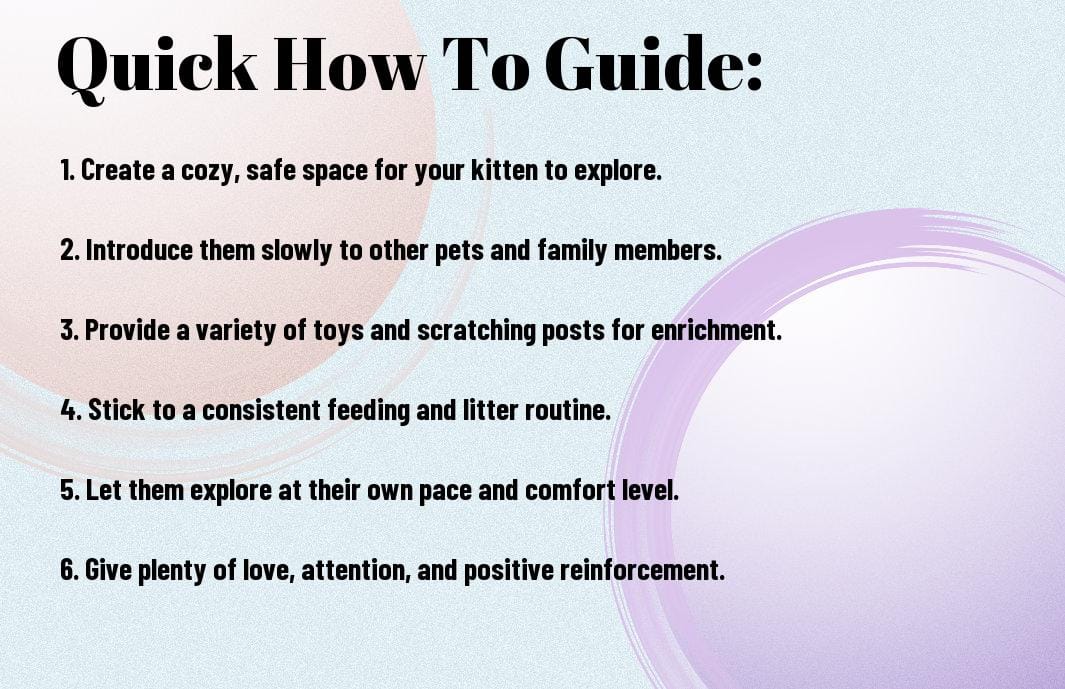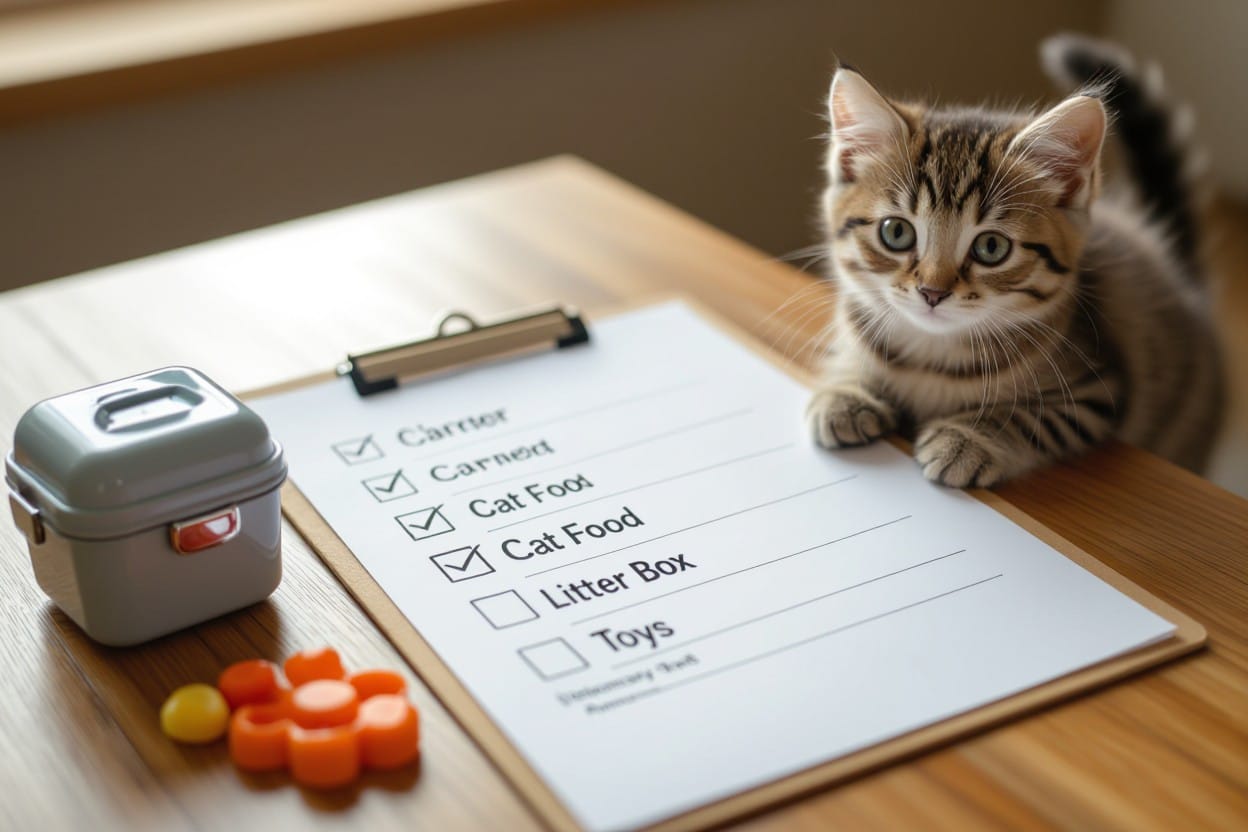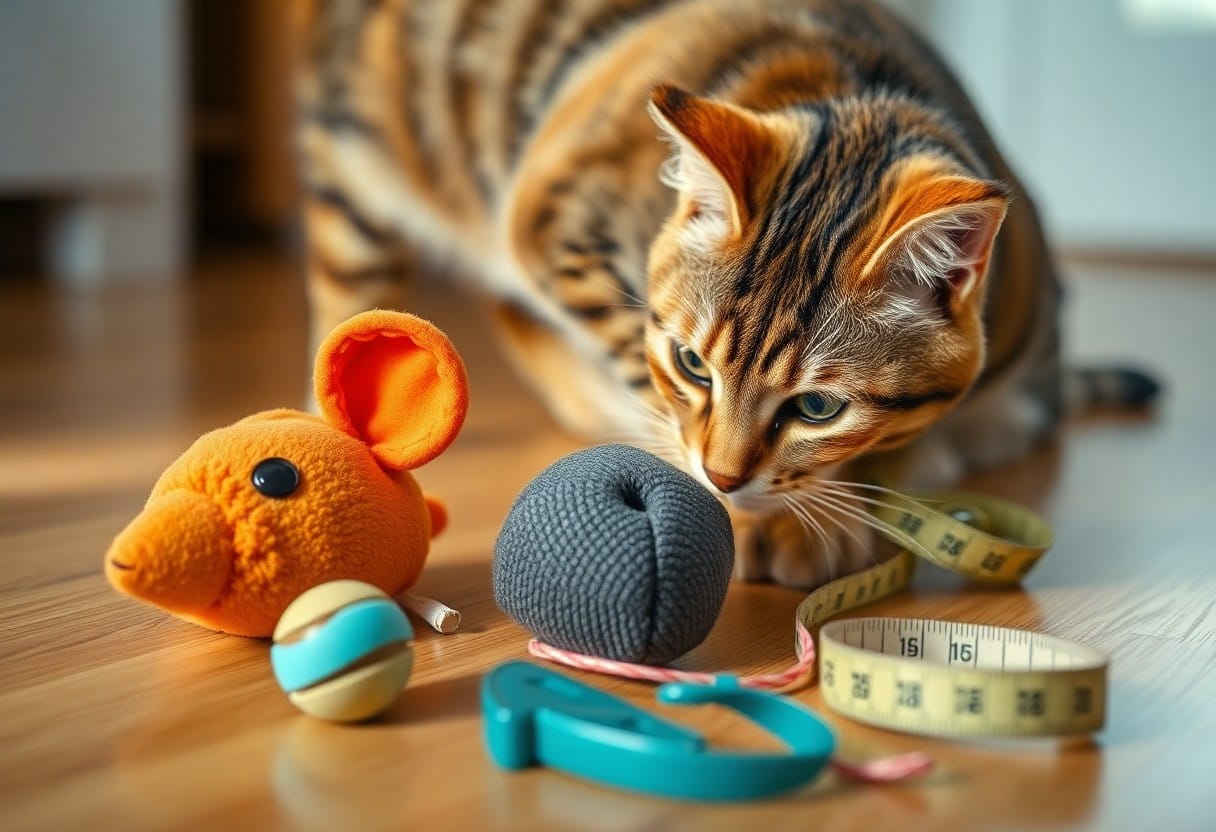Overwhelmed by the idea of bringing a new kitten into your home? Helping your kitten adjust to their new environment is crucial for their well-being and your sanity. With the right tips and techniques, you can make the transition as smooth as possible for your new furry friend.

Preparing for Your Kitten’s Arrival
Even before bringing your new kitten home, it’s crucial to prepare for their arrival. This not only ensures a smooth transition for your new feline friend but also helps in creating a comfortable space for them to settle in quickly.
Selecting the Right Supplies
There’s a variety of supplies you’ll need to have ready when your kitten arrives. This includes a cozy bed or blanket for them to cuddle up in, a litter box with unscented litter, food and water dishes, high-quality kitten food, toys for entertainment, a scratching post to fulfill their natural instinct to scratch, and a collar with an ID tag in case they ever wander off. Making sure that these crucials are in place will help your kitten feel secure in their new environment.
Creating a Kitten-Friendly Space
Kitten-friendly spaces are crucial for your new pet to feel safe and secure in their new home. Kitten-friendly spaces should be quiet, warm, and free of any hazards that could potentially harm your kitten. Designate a specific area in your home where your kitten can retreat to if they’re feeling overwhelmed. You can set up their bed, food and water dishes, and litter box in this space to provide a sense of familiarity.
Kitten-friendly spaces should also include interactive toys and scratching posts to keep your kitten mentally stimulated and physically active. It’s important to create a space where your kitten can play, explore, and rest comfortably.
For instance, you can place a cat tree near a window so your kitten can watch the world outside while basking in the sunlight. Remember to provide hiding spots like boxes or tunnels for your kitten to retreat to when they need some alone time. By setting up a suitable environment for your new kitten, you’re helping them feel secure and confident in their new surroundings.
The First Day
Bringing Your Kitten Home
Some of the most crucial moments in your kitten’s life occur during the first day in their new environment. It’s vital to create a smooth transition for them to feel safe and secure. Upon arrival, introduce your kitten to their designated space, such as a cozy bed or a quiet room away from noise and other pets. Allow them to explore at their own pace, providing reassurance with gentle pets and soft words.
Tips to Ease Initial Anxiety
Little gestures can go a long way in helping your kitten cope with the initial anxiety of a new home. Keep their surroundings quiet and soothing, minimizing sudden noises or movements. Provide a warm blanket or bedding that carries familiar scents to comfort them. Keeping a consistent routine for feeding and playtime can also establish a sense of security.
- Offer a variety of safe toys to engage and distract your kitten.
One effective way to ease your kitten’s anxiety is to establish a designated area for their food, water, and litter box. This helps create a sense of stability in their new environment, allowing them to feel more at ease. Ensure these imperatives are easily accessible and placed away from high-traffic areas.
- Give your kitten plenty of time and space to acclimate to their surroundings.
With patience and understanding, you can help your kitten adjust smoothly to their new home, setting a positive foundation for a happy and healthy future together.
Nutrition and Feeding
Understanding Kitten Nutrition
For all cat parents, understanding the nutritional needs of your kitten is crucial to ensure they grow up healthy and strong. Kittens have specific dietary requirements that differ from adult cats. They need a diet that is rich in protein for their growth and development, as well as vital nutrients like taurine, which is vital for heart and eye health.
Establishing a Feeding Routine
Establishing a feeding routine for your kitten is vital for their overall well-being. Start by choosing a high-quality kitten food that is specifically formulated for their age. It’s recommended to feed kittens multiple times a day to meet their energy needs as they are growing rapidly. Creating a consistent feeding schedule will help regulate their metabolism and digestive system.
With establishing a feeding routine, it’s important to provide fresh water at all times for your kitten. Water is vital for their hydration and overall health. Monitor your kitten’s feeding habits and adjust the portion sizes accordingly to prevent overeating or underfeeding. It’s also advisable to consult with your veterinarian to get personalized recommendations based on your kitten’s specific dietary needs.
Litter Box Training
Choosing the Right Litter and Box
Keep in mind that your kitten’s litter box is their personal space, so it’s necessary to choose the right litter and box to make them feel comfortable using it. Any sudden changes in litter type or box style can confuse your kitten and lead to accidents outside the box. When dicking out a litter, opt for a non-clumping, unscented litter initially as some kittens may find scented litters unpleasant. As for the litter box, choose a shallow, easily accessible box with low sides to make it easier for your kitten to climb in and out.
Litter Training Tips
With litter training, consistency is key. Place the litter box in a quiet, easily accessible location away from their food and sleeping area. Right after your kitten wakes up, after meals, and playtime, gently place them in the litter box to encourage them to use it. Use positive reinforcement such as praise, treats, or gentle pets when they use the litter box correctly. Perceiving any signs of discomfort or resistance, stop and try again later.

Socialization and Bonding
Factors Influencing Kitten Socialization
Once again, socialization plays a crucial role in shaping your kitten’s behavior and temperament. There are several factors that can influence the socialization process of your kitten, including their early experiences, genetics, and the environment they are in. Kittens that have positive interactions with humans and other animals during their critical socialization period (between 2-7 weeks old) tend to grow up to be more confident and sociable. Genetics also play a role in determining your kitten’s temperament, as some breeds may have predispositions towards certain behaviors. Additionally, the environment in which your kitten is raised can have a significant impact on their social development.
- Early experiences with humans and other animals
- Genetics and breed predispositions
- Environmental influences
Perceiving the world through their senses is crucial during socialization. Exposing your kitten to various sights, sounds, and smells in a controlled and positive manner can help them become more adaptable and less fearful in new situations.
How-To Bond With Your Kitten
Clearly, building a strong bond with your kitten is vital for their overall well-being and happiness. To create a lasting connection with your feline friend, spend quality time with them each day engaging in interactive play, grooming, and cuddling. This will not only strengthen your bond but also help your kitten feel safe and secure in their new environment.
Your kitten may show affection in different ways, such as purring, kneading, or rubbing against you. It’s important to pay attention to their body language and respond appropriately to their cues to build trust and communication. Additionally, providing a consistent routine and positive reinforcement through treats and praise can help reinforce your bond with your kitten.

Health and Wellness
Setting Up the First Vet Visit
Not only is it important to provide your kitten with a nutritious diet and plenty of love, but one of the key steps in ensuring their health and well-being is scheduling their first visit to the vet. This initial check-up is important for establishing a baseline of your kitten’s health and detecting any potential issues early on.
Recognizing and Addressing Health Issues
There’s no doubt that kittens are resilient creatures, but they are still vulnerable to various health issues. It’s crucial for cat owners to be vigilant in recognizing signs of distress or illness in their kittens. Common health problems in kittens include respiratory infections, parasites, and urinary tract issues.
Visit your vet promptly if you notice any unusual symptoms such as lack of appetite, lethargy, diarrhea, vomiting, or difficulty breathing. Early detection and treatment of health issues can make a significant difference in your kitten’s overall well-being.
Final Words
As a reminder, helping your kitten adjust to their new environment requires patience, consistency, and understanding. By providing a safe space, socialization opportunities, and a comforting routine, you can help your kitten feel secure and confident in their new surroundings. Remember to monitor their behavior closely and provide any necessary support or adjustments to ensure a smooth transition.
In the final consideration, with the right approach and a caring attitude, you can make the adjustment period for your kitten a positive experience. Be mindful of their needs, offer plenty of affection and reassurance, and soon enough, your kitten will feel right at home in their new environment. By following these guidelines, you can help your kitten thrive and build a strong bond that will last a lifetime.
FAQ
Q: Why is it important to help your kitten adjust to their new environment?
A: It is important to help your kitten adjust to their new environment to minimize stress and anxiety, allowing them to feel safe and comfortable in their new home.
Q: How can I help my kitten adjust to their new environment?
A: You can help your kitten adjust by providing a quiet and safe space, introducing them to their litter box and food/water dishes, and slowly introducing them to other family members and pets.
Q: What should I do if my kitten is not adjusting well to their new environment?
A: If your kitten is not adjusting well, be patient and give them time to acclimate. You can also consult with a veterinarian or animal behaviorist for additional guidance and support.
Q: Should I establish a routine for my kitten to help them adjust?
A: Yes, establishing a routine for your kitten can help them feel more secure and know what to expect. This can include feeding times, playtime, and bedtime activities.
Q: How long does it typically take for a kitten to adjust to their new environment?
A: Every kitten is different, but in general, it can take anywhere from a few days to a few weeks for a kitten to fully adjust to their new environment. Patience and consistency are key during this adjustment period.
















